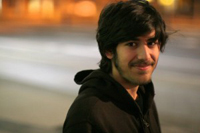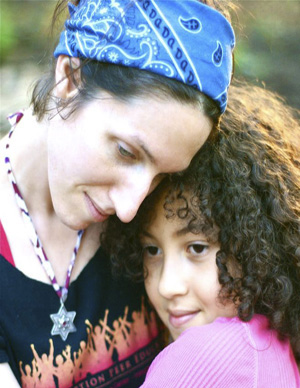
 |
||
About Articles Quotes Editor's Blog |
||
The Value of Knowledge:
|
 |
The suicide of autodidact, computer programmer, and Internet activist Aaron Swartz in 2013 raises some important questions about the value, control, and purpose of knowledge. Aaron’s life and death have prompted grown life learner Lauren Wales to ponder some of those questions via her own deeply personal struggle with controlled knowledge. |
I never knew Aaron Swartz, although both of us were friends with grown unschooler Peter Kowalke. Like Aaron, though, I came to activism not out of some cavalier attempt to overthrow the government and make chaos, but out of a sincere questioning of our social systems.
As I listen to the news reports about Aaron’s life, so many of them seem to miss something key to his work: the unschooler understanding that knowledge is free, yes, but it means nothing if it is not implemented and shared.
| “The world’s entire scientific … heritage … is increasingly being digitized and locked up by a handful of private corporations. … The Open Access Movement has fought valiantly to ensure that scientists do not sign their copyrights away but instead ensure their work is published on the Internet, under terms that allow anyone to access it.” ~ Aaron Swartz |
Knowledge is all around us, waiting to be shared. As I grow into my thirties and discover my role in community and vocation more thoroughly, pursuing an undergraduate degree in anthropology, I find myself in a social group comprised mostly of professors, writers and researchers. In essence, academics.
The biggest concern I have with joining academia is probably obvious to all of you: How useful is this knowledge if it is held in power structures that limit access to it?
Perhaps you know the familiar joke by academics: No one reads dissertations and articles except those who are also writing dissertations and journal articles. But how many are willing and ready to jump out of the ivory tower and become knowledge-seekers, not only members of an academy?
I understand that the death of Aaron was in some ways a wakeup call, that many academics are now beginning to offer links to their articles for free on their blogs and websites. I see that as true social justice, as activism.
I don’t believe that the freedom of information that Aaron was fighting to preserve, and for which he took strong actions that ultimately led to federal indictment, was really about information. Information is neutral. It is like electricity, in that it can power the batteries of our laptops, or strike the tallest, driest ponderosa pine and set in motion a massive forest fire. Information does nothing until it is shared. Once it is shared, it becomes knowledge in practice. It may become unpredictable; it may spark new ideas or breathe life into those traditional ideas in danger of being lost; it may lead to discoveries and even changes in structures.
I don’t think Aaron was fighting for the freedom of information. He was fighting for the freedom to use information. And this freedom to use information could lead anywhere, which was threatening to the existing power structures that benefit from the status quo.
 The author and her daughter. |
Coming head to head with power structures in my own pursuit and sharing of knowledge is what confirmed for me the necessity of activism, and why Aaron’s death touched me so deeply.
Dictated by Power
By the age of twenty-five, I was pursuing my dream work despite long odds, as I have been a single mama since the age of twenty-two. By my mid-teens, I knew I had a passion for birth work. As an unschooler, I followed this passion by reading and learning everything I could about birth, particularly the unique and empowering work of midwives attending out-of-hospital births.
As I navigated through this idea of birth and how it works, soaking up every bit of knowledge I could and even traveling to meet the famous Ina May Gaskin and her Farm midwifery community to learn with them, I found myself thoroughly at home in my sense of purpose and joy of learning. My self-initiative was welcomed in that community; midwifery has always been a profession of direct learning through action, often apprenticeship. It also weaves creativity, cross-cultural sharing and intellectual knowledge of health and biology into the work. It is an endless field of learning for the innately curious person.
But wait! What midwifery does not have is state-sanctioned legitimacy where I live (outside of nursing, which has some severe practice restrictions in my state). To date, about half of all states license out-of-hospital midwives, and despite midwife and consumer lobbying efforts, medical lobbyists have been successfully preventing licensure in my state and others.
Ostensibly, this denial of legitimacy is on the basis of safety. But certified and licensed midwives have been studied and found as a group to be using safe evidence- based practices. Midwives also are implemented in many other countries as primary care providers for healthy birthing women.
I came to see that certification had become a political issue around who had the right to this knowledge about birth and its practice in community.
Certainly, the midwives did not have this right. In my work as a doula, I had seen that the right to knowledge in practice was not often held with the birthing women either, but with the existing structures of the medical system – physicians, hospitals, insurance companies, and sometimes the legal system.
Everything Could Be Taken Away
A friend, informal mentor, and practicing midwife in a neighboring county found herself being investigated and threatened with a felony for practicing medicine without a license in 2007. This midwife was a suburban Christian homeschooling mom of five, yet the medical board felt it necessary to call in officers with guns and a warrant to search her home. She went through over a year of harassment, including the confiscation of all of her private client files, computers and equipment, and eventually felony court proceedings. She pled guilty to a lesser charge and, after serving time on house arrest, she moved to Canada where she now practices as part of the Canadian health system.
I worked as an activist on her behalf, volunteering as a consumer lobbyist to share information and garner support for her and for the licensure of midwives in our state. My friend was nationally certified but it made no difference without state licensure.
The following year, I found that I was to understand this issue of knowledge and power even more closely. In 2008, I was investigated by our state medical board for my presence at a birth. To preserve confidentiality, I won’t share the details. But suffice it to say, I am not a midwife, nor do I claim to be one. However, I was present for someone who had chosen to claim her right to birth at home – which is not illegal.
The investigation from my presence at the birth lasted a year and a half, threatening my livelihood as a licensed massage therapist. It also put custody of my daughter in jeopardy, and I feared I would lose custody to my ex-partner, who had sued for custody before.
| “When we talk of … the role of unschooling to allow intellectual liberation in its participants, we need to realize that we’re not truly free unless we’re liberated to access all the knowledge available.” |
Most importantly, it threatened my trust in that very unschoolerly processes of, as Joseph Campbell puts it, “following your bliss.” I wasn’t free to practice the knowledge I had acquired, as this knowledge was deemed outside the bounds of ordinary people and other types of practitioners who did not have a degree in the right university program. This is not to say that there is not a place for physicians – absolutely there is. But the place reserved for them is scenarios of morbidity and mortality where surgery and drugs save lives.
Like Aaron Swartz, I lived in fear that investigators were going to come at whim and enter my home and confiscate my books and my tools. I lived in fear they might come and use me to gain information about others in the birth community. I wasn’t naive enough anymore to believe that these kinds of things didn’t happen and, in fact, in a eulogy given at Aaron’s memorial, the speaker indicated that this kind of search did happen to Aaron during his federal investigation.
My investigation was small in scope, and I was able to ride through it to the other side without charges against me. But even though charges were not filed, the incident still had serious consequences for my life path, my self-esteem, and my ability to stay in the community of birthworkers in an active way.
I was harassed by phone, interrogated in person and by letter, and I had my notes subpoenaed. After mourning the loss of my ability to continue studying without scrutiny, I made a choice. I decided I couldn’t let my passion stay muffled, and I would share it with the younger generations who would someday be having babies and who seemed, while self-aware, not to know too much about reproductive rights and the influence of power on their bodies outside of Roe v. Wade.
That is what led me to the social sciences. It was interesting work, and I would learn to speak the language of policy workers, researchers, and other academic thinkers. I’d unschool my way through some college degrees. My work in the academy is part of my activism, a tactic.
When we talk about knowledge, when we talk about being free, when we talk of the role of unschooling to allow intellectual liberation in its participants, we need to realize that we’re not truly free unless we’re liberated to access all the knowledge available. Perhaps it is time for those in the unschooling community and the academy to form radical alliances. Perhaps, with people like Aaron, this was already occurring. This kind of alliance certainly is part of the explicit intention of my scholarship, at least.
When I shared with a sociologist friend the basics of Aaron’s federal case, the social import of his decision to download thousands of documents from JSTOR, she responded with, “But those documents are free.”
Before I could respond, another woman in our writing group, a fellow non-traditional student and activist getting her doctorate, clarified: “Free for you, because you work in a university! JSTOR charges non-academics.”
This conversation is a beautiful example of enlightening collaboration, and also an example of Aaron’s legacy. I hope that those of us who continue to mourn Aaron Swartz will not stop considering how our knowledge is controlled, positioned, shaped, and shared by our society.
Lauren Wales is a grown unschooler, licensed massage therapist, and full spectrum doula. She lives in a small collective space in Cincinnati, Ohio, and runs Luminous Bodywork Ltd.